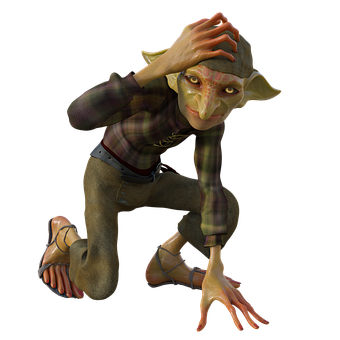| The name Rumpelstilzchen in German literally means "little rattle stilt," a stilt being a support post. A rumpelstilt or rumpelstilz is a type of imp that makes noise by rattling posts and rapping on planks. The meaning is similar to rumpelgeist ("rattle ghost") or poltergeist, a mischievous spirit that clatters and moves household objects. The ending -chen is a German diminutive similar to English -kin. |
| Imps were initially viewed as mischievous but harmless sprites. Around 1600, during the height of the Inquisition (witch-burnings and persecution of other religious minorities by the Catholic church during the 12th through 19th centuries), imps became associated with demons and as witch’s familiars. Imps were sought as proof of witchcraft; often the so-called imp was merely a black cat, lizard, toad, or some other uncommon pet. |
There are several varieties of fairy tales told about Rumplestiltskin. The basic plot is that the imp-man helps a young woman spin gold from straw in exchange for her firstborn child. She then marries the king and becomes queen. When her first child is born, Rumplestiltskin comes to collect the debt. When the queen provides his true name (instead of her child) he either flies away never to be seen again, stomps himself into the ground, or splits himself in two--depending on the version.
In one version, Rumplestiltskin is overheard revealing his true name in song:
"To-day I bake, to-morrow brew,
the next I'll have the young Queen's child.
Ha! glad am I that no one knew,
that Rumpelstiltskin I am styled."
In another variation:
“Tonight tonight, my plans I make,
tomorrow, tomorrow, the baby I take.
The queen will never win the game,
for Rumpelstiltskin is my name.”
Knowledge of a true name gives influence or magical power over another person according to European folklore. For example, in a legend of Saint Olaf, a troll builds him a church, but Olaf avoids payment by learning the troll’s true name.
Interesting that the imps (and trolls) are the ones vilified in these stories of humans reneging on their debts. A possible parallel to the ways European colonialists historically took from Indegenous cultures and from the Land without offering recompense?
In one version, Rumplestiltskin is overheard revealing his true name in song:
"To-day I bake, to-morrow brew,
the next I'll have the young Queen's child.
Ha! glad am I that no one knew,
that Rumpelstiltskin I am styled."
In another variation:
“Tonight tonight, my plans I make,
tomorrow, tomorrow, the baby I take.
The queen will never win the game,
for Rumpelstiltskin is my name.”
Knowledge of a true name gives influence or magical power over another person according to European folklore. For example, in a legend of Saint Olaf, a troll builds him a church, but Olaf avoids payment by learning the troll’s true name.
Interesting that the imps (and trolls) are the ones vilified in these stories of humans reneging on their debts. A possible parallel to the ways European colonialists historically took from Indegenous cultures and from the Land without offering recompense?



 RSS Feed
RSS Feed